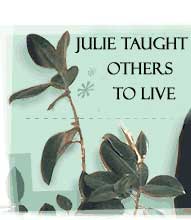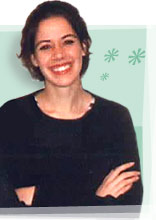The Rediff US Special/Claire B Smith


One night, over a year ago, my 22-year old best friend, Julie Sherali, called.
"Claire, I don't know how else to say this... I'm in the hospital and I have leukemia," she said.
I could hardly reply. I had talked to Julie three days before that, when everything had been fine. But suddenly she had been diagnosed with acute myeloid leukemia, an aggressive cancer of the blood marrow and lymph nodes.
Seven months after that phone conversation, after two trips to Atlanta to hold Julie's hand in the hospital, after nights spent crying because there was nothing I could do to save my best friend, I found myself at an Indian Independence day mela in Long Island, New York. Julie had become so sick that she needed a bone marrow transplant. Although she was born in Atlanta, Julie's parents are from Bombay and her best chance of finding a match was probably with someone of the same ethnic background.
I went to Long Island, with an organization called SAMAR, which helps to find donors in the Indian community, in the hope of persuading more Indians to get tested for possible matches.
Although there are 3.3 million people in the National Bone Marrow Registry, only 25,000 of them are of South Asian descent. The situation is even more difficult because 70 per cent of leukemia patients can't find a donor in their own family and a match is found in only 1 out of 20,000 from the same racial group. Most South Asians simply aren't aware of the dire situation their group is in. There is often a fear, among potential donors, that they might become ill. And many just don't know how hard it is to find a match.
SAMAR is run by Rafiya Peerboy Khan and her husband, Moazzam. The Khans started the organization in 1992 and have since recruited more than 15,000 volunteers.
This was the second Indian festival I had gone to with SAMAR and while the Khans stayed at the booth taking blood, my job was to walk through the crowd, holding a picture of Julie and asking people to get tested. This was not an easy task as most of the people attending the festival were there to have fun and celebrate their heritage. I could almost see myself reflected in the glittering jewels of their saris... a young white girl with no clue of Indian culture.
I pushed on though and felt a rush every time I saw someone, with whom I had spoken, approach the booth to have their blood drawn. Any one of these people could be the person who saves Julie's life, I kept thinking.
Late in the afternoon, when the festive performances were interrupted to allow me to make a brief announcement on behalf of Julie, I approached the stage on shaky legs. I knew this was going to be one of the hardest things I would ever do. I am terrified of public speaking. I tried to think of Julie, whom I had known since high school.
She was the best friend I have ever had and the most caring person I have ever known. I felt relief in the fact that I was physically able to do something for her. I thought of her family, her mother and father, her stepmother and stepfather, her two little half-sisters. I could picture them all seated around her bed. They were counting on me.
Moazzam Khan stopped me on the way to the stage. "When you say Julie's name up there," he said, "use the last name Dabholkar, instead of Sherali." Dabholkar, Julie's mother's last name, is a Hindu name. Sherali, her father's, is Muslim. The audience was predominantly Hindu. I had never thought of her as Julie Dabholkar and the feel of it on my tongue felt strange, but if a name could save her life then I could definitely say it.
My voice skittered out across the audience of 200, as I held up the green flier, with her high school picture on it. "This is my best friend, Julie Dabholkar, and she has leukemia."
But in the end, Julie just ran out of time. In August she attempted an experimental stem cell transplant at Emory University in Atlanta. But this procedure was unsuccessful. Julie died two days after her 23rd birthday. January 10, 2001.
I spent time with Julie in the last days of her life and I know she tried her hardest to embrace death as bravely as she had life. Julie's death has left a great hole in my life that will not easily be filled, but I will never forget what she taught me about friendship and reaching out to others. Although we did not find a match that day for Julie, there still could have been many matches made for the other patients who are waiting for donors.
For more information about SAMAR and what they do, please visit their web site:
www.samarinfo.org
Design: Dominic Xavier
Back to top
Tell us what you think of this feature